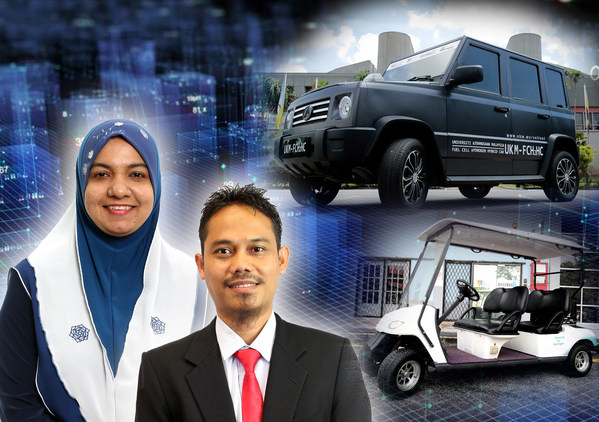Universiti Kebangsaan Malaysia Researchers Develop Hydrogen Fuel Cell Vehicles
KUALA LUMPUR,Malaysia,March 14,2022 -- Two researchers from Universiti Kebangsaan Malaysia (UKM) developed hydrogen hybrid vehicles that run on hydrogen fuel cells and emit zero carbon emissions.

UKM researchers developed hydrogen hybrid vehicles that run on hydrogen fuel cells,which combine hydrogen and oxygen to produce electrical energy and harmless water vapour as a byproduct.
They are Professor Ir. Dr. Siti Kartom Kamarudin and Associate Professor Dr Mohd Shahbudin Mastar @ Masdar from the UKM Fuel Cell Institute,who led the research and development of the UKM FCH2HC,a mini version of a hybrid SUV,and the UKM-FCH2B,a buggy.
The hydrogen fuel cell vehicles were developed in collaboration with industry partners through the modification of electric vehicles.
According to Siti Kartom,the UKM-FCH2B is unique as the battery has been replaced with a fuel cell system as an electrical power source to improve the buggy's operational efficiency,as well as a 3000 W stationary power generator for electrical appliances.
"Meanwhile,the UKM-FCH2HC is a hybrid vehicle that combines a fuel cell and a battery in a 0.5 ratio,with each power source capable of providing a capacity of up to 10 kW,allowing the vehicle to travel further.
"The fuel cell system is equipped with humidifiers and water coolers as supporting units to ensure optimal system performance at all times," she said.
Siti Kartom explained that a fuel cell generates electricity through electrochemical reactions between hydrogen and oxygen in the surrounding environment.
"During the reaction,hydrogen and oxygen combine to produce electrical energy and harmless water vapour as a byproduct,making hydrogen safe because it does not contaminate or harm the surrounding environment,unlike liquefied petroleum gas.
"We began this project about fifteen years ago with fundamental research to develop high-quality catalysts and membranes. Only in the last three years have we been able to bring together all of the fundamental components needed to develop the vehicle's system.
"As both the SUV and buggy will be used on campus,the speed is limited to 60 kilometres per hour. My team and I are looking forward to working on a second generation of the vehicles with increased capacity," she said.
Mohd Shabuddin added that the vehicles generate electricity via a hydrogen-powered fuel cell rather than relying solely on a battery.
"The quick charging time of a cell fuel hydrogen car is a significant advantage. Fully electric vehicles require seven to eight hours to charge,depending on the charging station and battery capacity.
"Hydrogen fuel cell cars,on the other hand,offer faster refuelling times that can take less than three minutes depending on the pressure," he said.
He added that one of the most difficult aspects of developing hydrogen cell fuel vehicles is their high cost.
"We believe in the country's direction toward greener energy,which will result in mass production of these vehicles,lowering the cost of production for road users.
"The recent Twelfth Malaysian Plan includes hydrogen as one of the government's renewable energy initiatives to develop hydrogen-powered vehicles,which I believe is a good start for the future of this technology," he said.
UKM Fuel Cell Institute has also been appointed as the Head of the Research Excellence Consortium Programme in the Transportation and Mobility category by the Ministry of Higher Education.
The hydrogen fuel cell vehicles were launched by UKM Vice Chancellor Prof. Dato' Ts. Dr. Mohd Ekhwan Toriman.
The launching symbolises the support and commitment of UKM towards Malaysia's Low Carbon Mobility Development Plan 2021-2030 to reduce greenhouse gas up to 45 percent by 2030 and to be listed as a carbon-neutrality country by 2050.
The move is consistent with the Sustainable Development Goal (SDG) by United Nations under pillar 7 – access to affordable and clean energy.